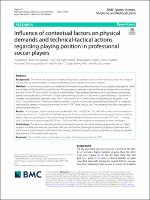Por favor, use este identificador para citar o enlazar este ítem:
https://repositorio.usj.es/handle/123456789/778
Registro completo de metadatos
| Campo DC | Valor | Lengua/Idioma |
|---|---|---|
| dc.contributor.author | Díez, Adrián | - |
| dc.contributor.author | Lozano, Demetrio | - |
| dc.contributor.author | Arjol-Serrano, José Luis | - |
| dc.contributor.author | Mainer Pardos, Elena | - |
| dc.contributor.author | Castillo, Daniel | - |
| dc.contributor.author | Torrontegui-Duarte, Marcelino | - |
| dc.contributor.author | Nobari, Hadi | - |
| dc.contributor.author | Jaén-Carrillo, Diego | - |
| dc.contributor.author | Lampre, Miguel | - |
| dc.date.accessioned | 2022-05-11T10:58:31Z | - |
| dc.date.available | 2022-05-11T10:58:31Z | - |
| dc.date.issued | 2021-12-16 | - |
| dc.identifier.citation | Díez, A., Lozano, D., Arjol-Serrano, J.L. et al. Influence of contextual factors on physical demands and technical-tactical actions regarding playing position in professional soccer players. BMC Sports Sci Med Rehabil 13, 157 (2021). https://doi.org/10.1186/s13102-021-00386-x | es_ES |
| dc.identifier.issn | 2052-1847 | es_ES |
| dc.identifier.uri | https://repositorio.usj.es/handle/123456789/778 | - |
| dc.description.abstract | Background The aim of this study was to analyse the physical demands and technical-tactical actions for each playing position according to game location and final outcome in professional soccer players. Methods A convenience sample was obtained from twenty-one professional male soccer players, belonged to same soccer team of the Spanish Second Division. Players' physical demands were monitored during each match using a portable 18 Hz GPS unit and 600 Hz triaxial accelerometer. These analysed demands were total distance, moderate speed running distance (>14.4 km center dot h(-1)), high-speed running distance (>19.8. km center dot h-1), sprint distance (>25.0 km center dot h(-1)), number of accelerations between 2 and 4 m center dot s(-2) and above 4 m center dot s(-2), and number of decelerations between 2 and 4 m center dot s(-2) and above 4 m center dot s(-2). The data related to technical-tactical actions were obtained from WyScout (R), a computerized multiple-camera tracking system based on the OPTA (R) track analysis tool. The obtained indicators were general, defensive and offensive. Results For all players, higher total distance (p = 0.045; effect size [ES] = 0.24, small effect) was covered and greater deceleration 2-4 m center dot ss(-2) (p = 0.001; ES = 0.68, medium effect) was performed when the team plays at home and lose and for all players, playing at home and winning demanded higher defensive volume (p =0.014; ES = - 1.49, large effect) and no interceptions (p =0.031; ES = - 1.40, large effect) in comparison to playing at home and losing. Conclusions The physical demands and technical-tactical actions vary when contextual game factors (i.e., match location and final outcome) are considered. We can confirm that, although the training of physical demands does not influence the final result of the match, the training of technical tactical actions could help to achieve an optimal performance of the team to win matches. | es_ES |
| dc.format.extent | 14 | es_ES |
| dc.format.mimetype | application/pdf | es_ES |
| dc.language.iso | eng | es_ES |
| dc.publisher | BMCCAMPUS, 4 CRINAN ST, LONDON N1 9XW, ENGLAND | es_ES |
| dc.relation.requires | Adobe pdf | es_ES |
| dc.rights | Atribución 4.0 Internacional | * |
| dc.rights.uri | http://creativecommons.org/licenses/by/4.0/ | * |
| dc.subject | Soccer | es_ES |
| dc.subject | Performance | es_ES |
| dc.subject | External training load | es_ES |
| dc.subject | Contextual game factors | es_ES |
| dc.subject | GPS | es_ES |
| dc.title | Influence of contextual factors on physical demands and technical-tactical actions regarding playing position in professional soccer players | es_ES |
| dc.type | info:eu-repo/semantics/article | es_ES |
| dc.relation.publisherversion | https://bmcsportsscimedrehabil.biomedcentral.com/articles/10.1186/s13102-021-00386-x | es_ES |
| dc.identifier.publicationfirstpage | 1 | es_ES |
| dc.identifier.publicationlastpage | 14 | es_ES |
| dc.identifier.doi | 10.1186/s13102-021-00386-x | es_ES |
| dc.rights.accessrights | info:eu-repo/semantics/openAccess | es_ES |
| Aparece en las colecciones: | Artículos de revistas | |
Ficheros en este ítem:
| Fichero | Descripción | Tamaño | Formato | |
|---|---|---|---|---|
| Influence of contextual factors on physical demands and technical-tactical actions regarding playing position in professional soccer players.pdf | 987,46 kB | Adobe PDF |  Visualizar/Abrir |
Este ítem está sujeto a una licencia Creative Commons Licencia Creative Commons

